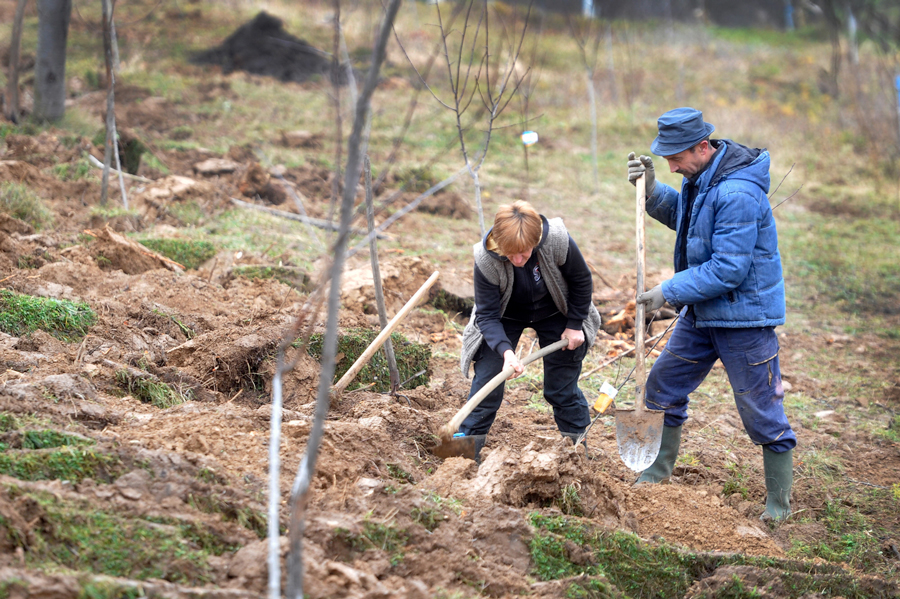FAO/EBRD host irrigation webinar for Serbia
 Miodrag Markovic and his wife Jelena sowing 300 seedlings plums in Krupanj, Serbia.
Miodrag Markovic and his wife Jelena sowing 300 seedlings plums in Krupanj, Serbia.Blessed with favourable agroclimatic conditions, Serbia is a leading grain exporter for the Western Balkans. But the country is highly vulnerable to climate change and drought, making a modern, well-functioning irrigation system a must.
Experts from Israel, Portugal and Spain recently shared their best practices on irrigation technology, management and governance with Serbian irrigation actors during the first in a series of webinars.
The European Bank for Reconstruction and Development (EBRD) and the Food and Agriculture Organization of the United Nations (FAO) organized the event, which was geared toward government representatives, farmers, irrigation input providers, academics and local administrators, attracting around 140 participants.
Serbia is developing a national irrigation strategy and five-year action plan, with support from FAO and the EBRD.
In her welcoming address, Natasa Milic, Director of Serbia’s Republic Water Directorate, spoke of how the Government of Serbia was committed to modernizing and expanding the country’s irrigation system and water infrastructure.
“The Government recognizes the importance of irrigation to agriculture, which is an important contributor to our GDP,” she said. “By working together with all stakeholders, we will be able to use the new irrigation strategy to set up a system that improves agricultural productivity, strengthens our climate resilience and contributes to savings in water and energy consumption.”
Innovations
Water stress and a semi-arid climate were among the environmental motivating factors behind Israel’s innovations in water management.
The country has developed advanced irrigation technologies, supports research and knowledge sharing and has adopted a holistic water management approach. Innovation is particularly strong in the area of water treatment – from treating urban wastewater for irrigation and desalinizing seawater for drinking water to maximizing production per unit of water used.
In Israel, all water resources are the property of the public, with a pricing system for different types of water, said Raanan Adin, President of Israel Water Association. Differential pricing provides farmers with incentives to irrigate with reused wastewater, where available, for example.
Good governance and collaboration between government authorities, water users and cooperatives are key.
“I can’t stress enough how critical governance, regulations and standards are for the effective management of advanced irrigation systems and for the resilience of the water and agriculture sectors, particularly during droughts,” Adin said.
Irrigation benefits
With a total of almost 4 million irrigated hectares, Spain leads the European Union in terms of irrigated area, according to Inmaculada Bravo Domínguez of Spain’s Ministry of Agriculture, Fisheries and Food.
Irrigated agriculture brings diverse economic, environmental and social benefits, she said. For example, one irrigated hectare of crops produces up to six times as much as one unirrigated hectare. Irrigation allows for crop diversification and rotation. It creates jobs in rural areas. And it prevents land erosion and desertification while preserving the landscape.
She added that Spain’s national irrigation policy revolves around the “modernization of infrastructure to increase water and energy use efficiency, technical advice to irrigators, innovation and training for improved water management, and strong collaboration among water users and irrigation communities.”
Diversification
Less than 2 percent of Serbia’s arable land is irrigated. The lack of irrigation not only threatens existing crop production but makes the transition to more lucrative crops like fruits and vegetables more challenging.
It is this very transition that the Alqueva Multipurpose project in southern Portugal has achieved.
Centred on the Alqueva reservoir, the project boasts modern infrastructure “capable of irrigating 170,000 hectares, producing electricity, and guaranteeing industrial and public water supply,” said Jose Pedro Salema, President of EDIA, which manages the project.
He added that the modern irrigation infrastructure has helped revolutionize Portugal’s olive oil production, with olive production almost doubling, and enabled the country to grow diverse fruits and vegetables.
Relying on the latest technologies, data and innovation, the project promotes sustainable development and the preservation of the environment and local cultural heritage.
Going forward
With EBRD and FAO support, key irrigation actors in Serbia will define the future of irrigation development in the country.
There will be a strong emphasis on policies, practices and key investments that boost Serbia’s agricultural productivity and agricultural diversification, promote sustainable development and strengthen resilience to a changing climate.
Access to the webinar recordings can be taken from here; the next session is slated for early 2021.
